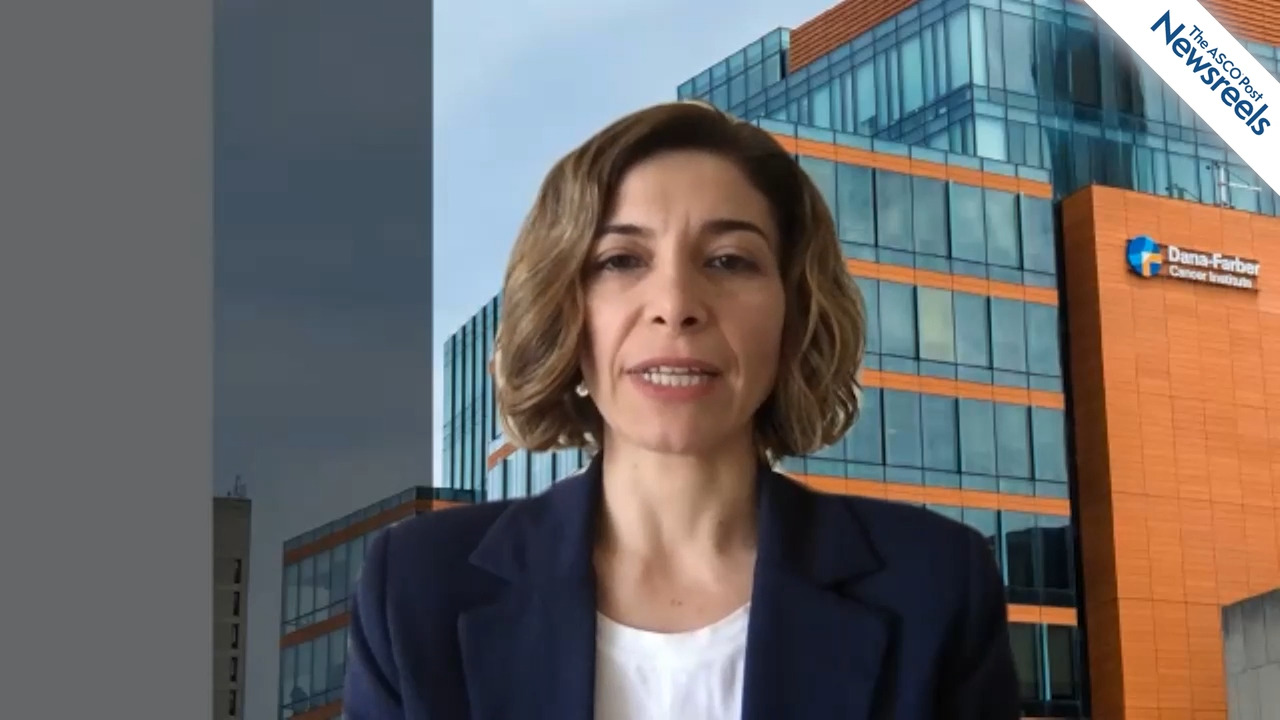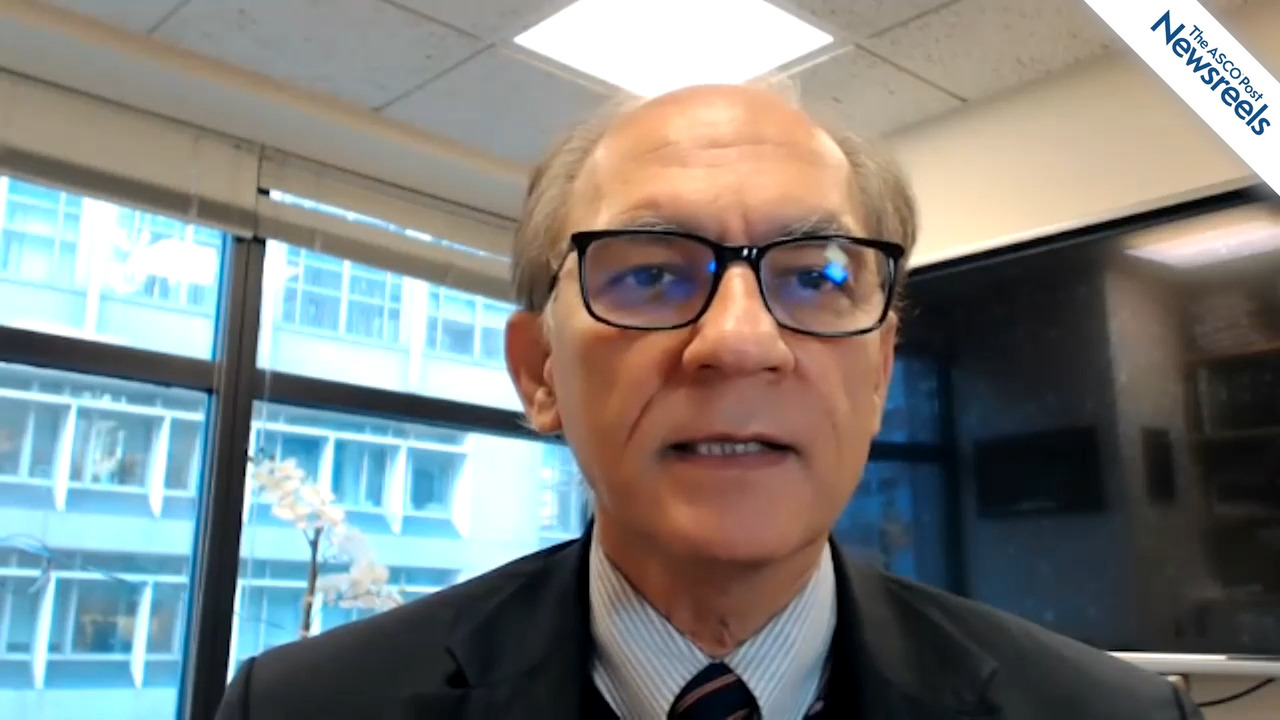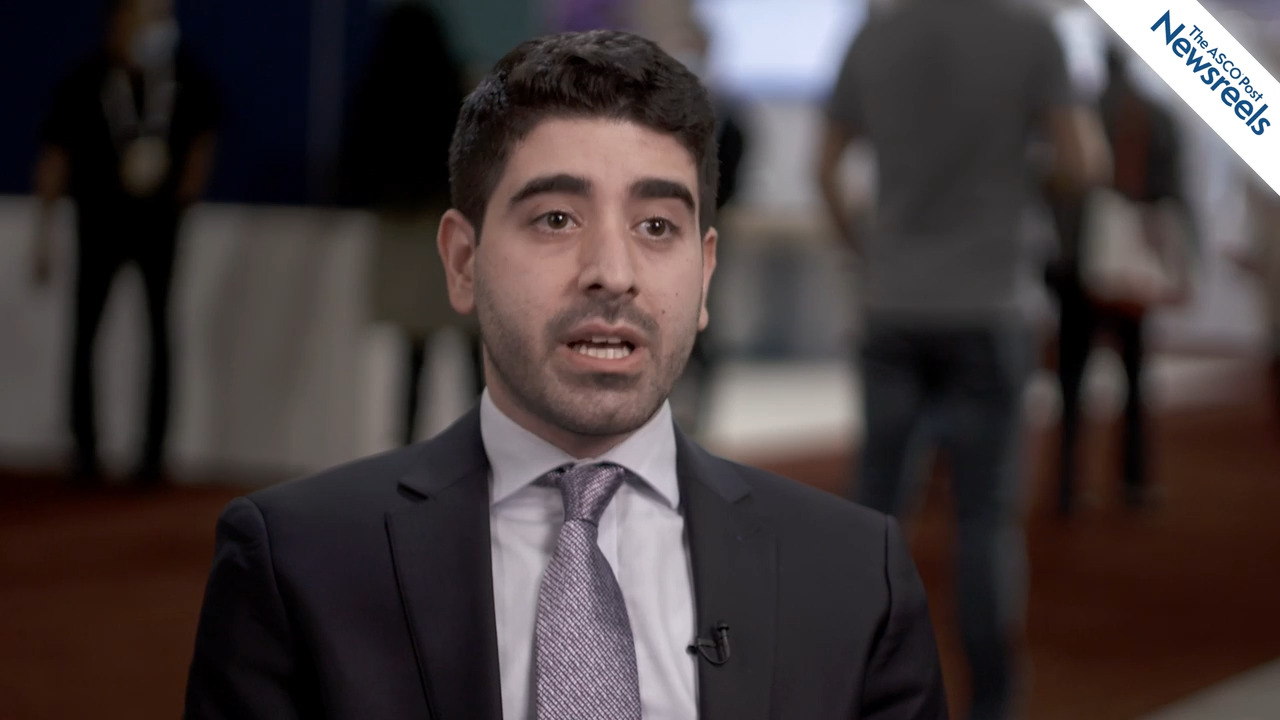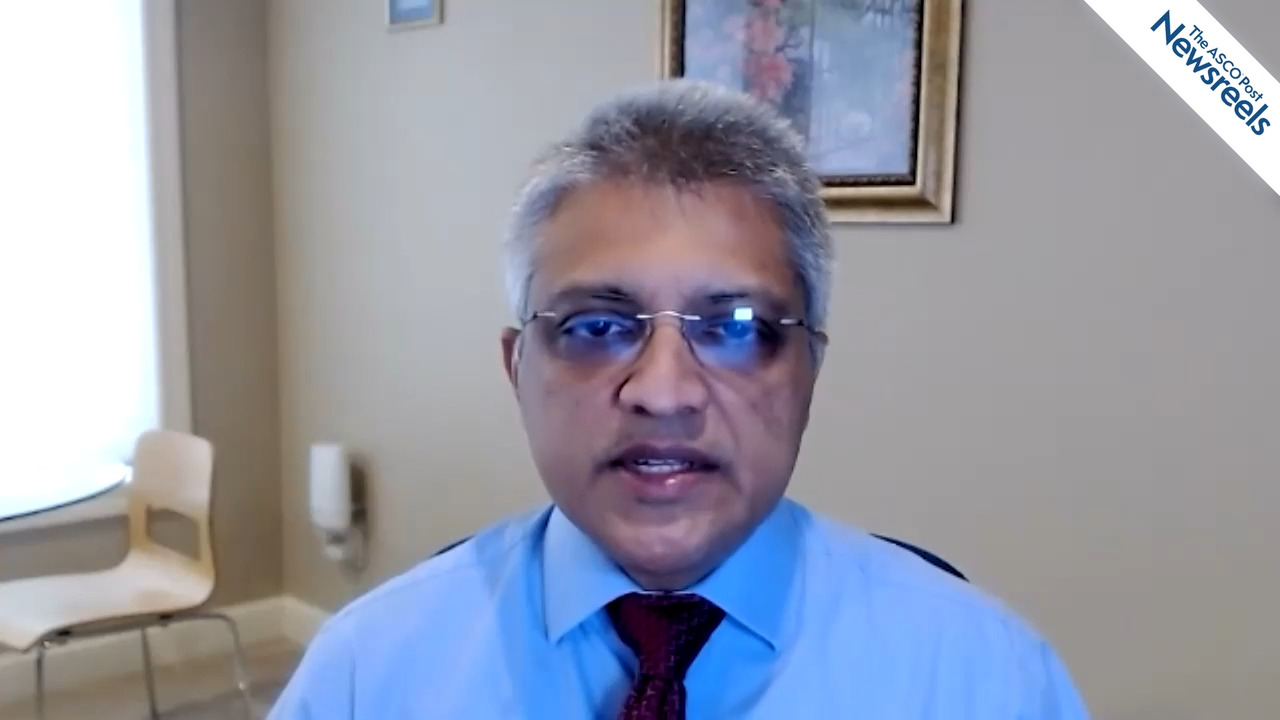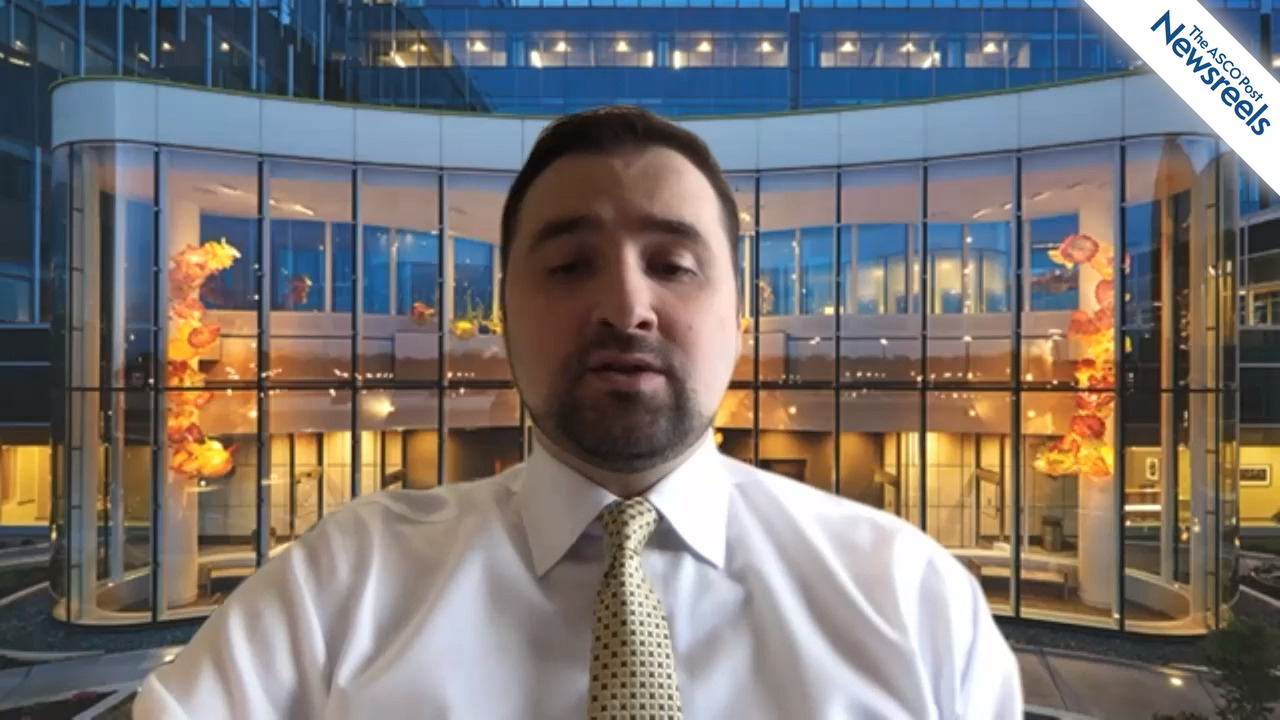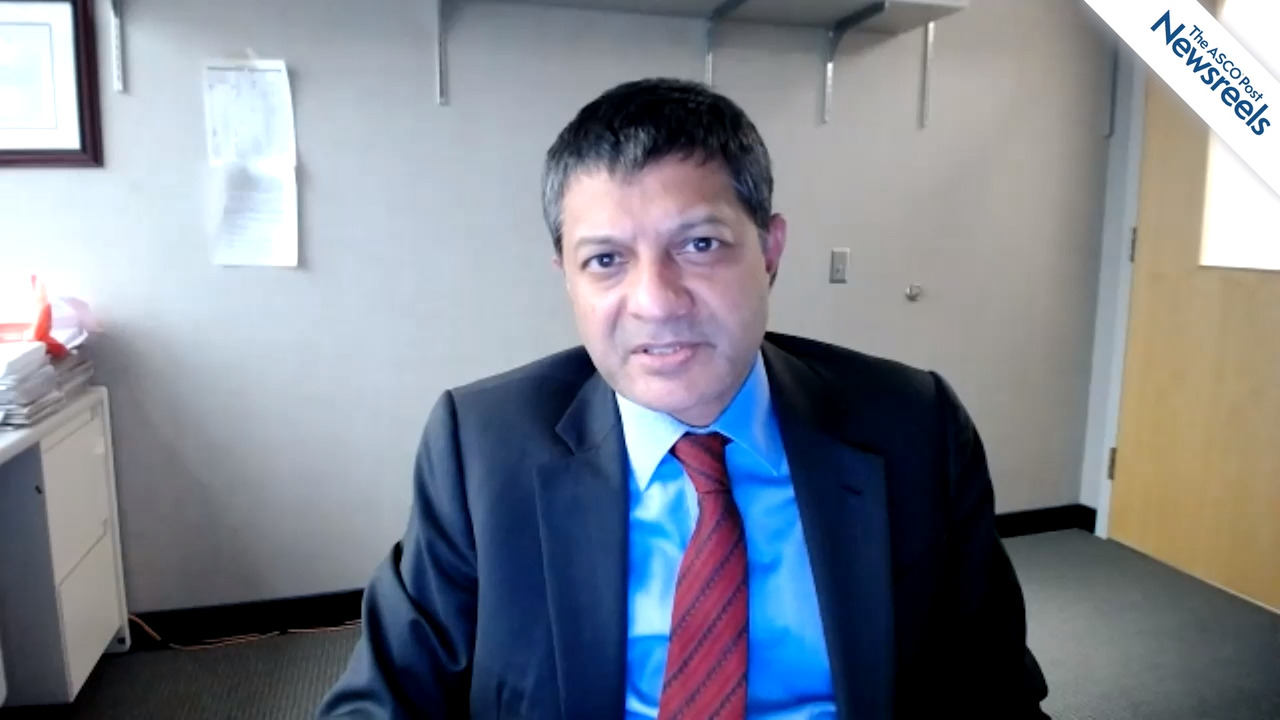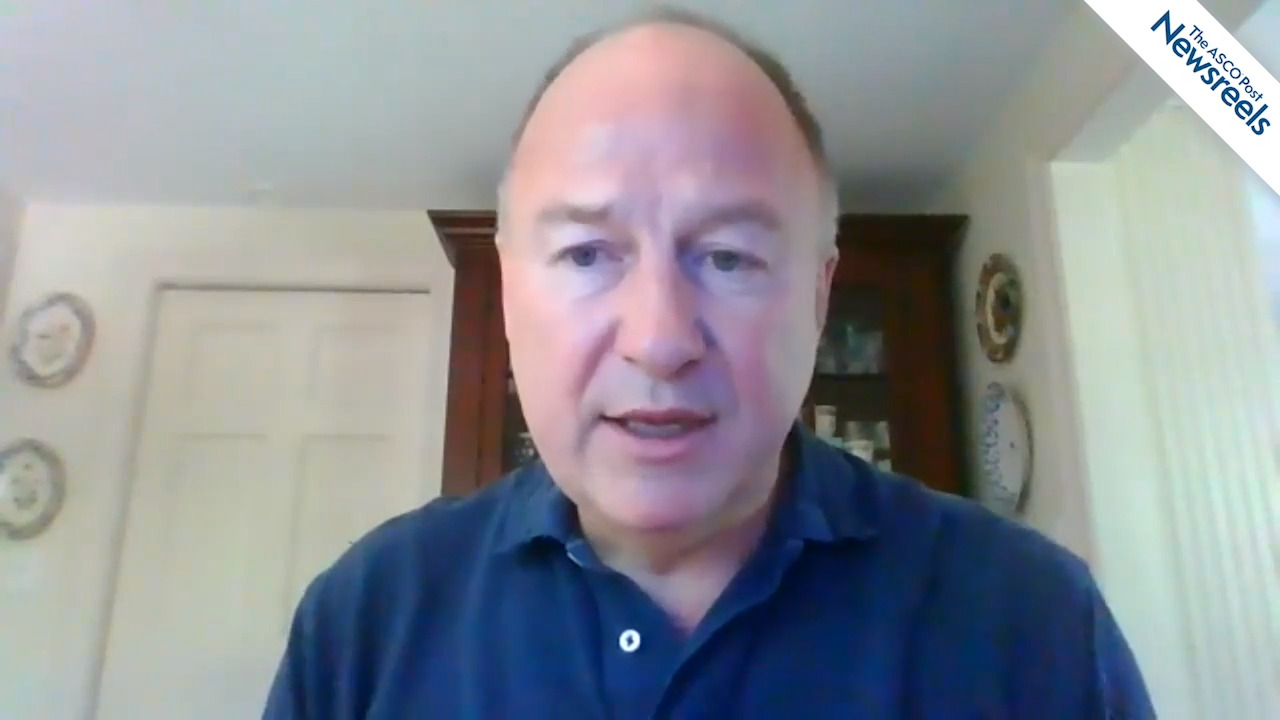Expert Point of View: Ajay K. Nooka, MD, MPH, FACP
Ajay K. Nooka, MD, MPH, FACP, Associate Professor in the Department of Hematology and Medical Oncology at Winship Cancer Institute, Emory University, Atlanta, commented on the promising emergence of bispecific T-cell engaging (bispecific) antibodies, as represented by studies presented at the 2021...
Bispecific Antibodies With Multiple Targets Moving Forward in Multiple Myeloma
Poor outcomes are observed in patients with myeloma who are refractory to multiple classes of therapies, with the average patient experiencing disease progression in up to 6 months and living no longer than 6 to 15 months. Patients often rapidly cycle through regimens that use less effective or...
In All Candor, What Does CANDOR Bring to the Table in Relapsed or Refractory Multiple Myeloma?
An updated analysis of the phase III CANDOR study—recently reported by Usmani et al and summarized in this issue of The ASCO Post—confirmed a significant progression-free survival benefit for the combination of daratumumab, carfilzomib, and dexamethasone (KdD) over carfilzomib and dexamethasone...
Continued Progression-Free Survival Benefit With Carfilzomib/Dexamethasone/Daratumumab vs Carfilzomib/Dexamethasone in Relapsed or Refractory Multiple Myeloma
In an updated analysis of the pivotal phase III CANDOR trial reported in The Lancet Oncology, Saad Z. Usmani, MD, of Levine Cancer Institute/Atrium Health, and colleagues found that the addition of daratumumab to carfilzomib and dexamethasone (KdD) continued to show a large progression-free...
Daratumumab/Hyaluronidase-fihj and Carfilzomib in Multiple Myeloma
On November 30, 2021, daratumumab/hyaluronidase-fihj and carfilzomib were approved for use in combination with dexamethasone for adults with relapsed or refractory multiple myeloma who had one to three prior lines of therapy.1,2 Supporting Efficacy Data Approval was based on findings in a cohort...
Isatuximab-Containing Induction Therapy for Multiple Myeloma Increases Measurable Residual Disease Negativity
For the first-line treatment of newly diagnosed multiple myeloma, the percentage of patients achieving measurable residual disease (MRD, previously called minimal residual disease) negativity was significantly greater when the anti-CD38 monoclonal antibody isatuximab was added to a standard...
Philip L. McCarthy, MD, Comments on Trials Evaluating the Early Detection of Myeloma
The ASCO Post invited myeloma expert Philip L. McCarthy, MD, Director of the Transplant and Cellular Therapy Program at Roswell Park Comprehensive Cancer Center, Buffalo, New York, to comment on the trials evaluating early detection of myeloma at the 2021 American Society of Hematology (ASH) Annual ...
Studies Evaluate Screening for Early Multiple Myeloma
Precursors to multiple myeloma were identified by population screening in two studies reported at the 2021 American Society of Hematology (ASH) Annual Meeting & Exposition. The prevalence of monoclonal gammopathies was determined in the PROMISE trial using cutting-edge technology in a high-risk ...
Report Describes Identification of a Novel Therapeutic Target for Multiple Myeloma
Proteasome inhibitors, the therapeutic backbone of current treatments for multiple myeloma, are effective in treating newly diagnosed disease, but resistance or intolerance to these molecules often develops, leading to relapse. While studying a neglected tropical disease, Buruli ulcer, researchers...
Romanos Sklavenitis-Pistofidis, MD, on Smoldering Myeloma: Identifying Biomarkers of Response to Immunotherapy
Romanos Sklavenitis-Pistofidis, MD, of Dana-Farber Cancer Institute, discusses study findings on a next generation of clinical assays to assess both tumor biology and immune state, as well as common clinical biomarkers in the marrow or blood. These biomarkers may accurately predict which patients with smoldering multiple myeloma might benefit from early treatment, monitor response to immunotherapy, and improve patient outcomes (Abstract 330).
Anil Aktas-Samur, PhD, on Identifying Low-Risk Smoldering Multiple Myeloma
Anil Aktas-Samur, PhD, of Dana-Farber Cancer Institute, discusses study findings on the genomic characterization of non-progressor smoldering multiple myeloma, results that may provide a molecular definition of the disease as well as its risk-driving features. Combining this low-risk model with current high-risk models may possibly improve clinical trials for patients with this early precursor to myeloma (Abstract 545).
Nikhil C. Munshi, MD, PhD, on COVID-19 Vaccine Effectiveness in Patients With Multiple Myeloma
Nikhil C. Munshi, MD, PhD, of Dana-Farber Cancer Institute, discusses the findings from a large nationwide Veterans Affairs study, which showed that, for patients with multiple myeloma, the effectiveness of the COVID-19 vaccine is reduced, likely due to patients’ immunosuppression. Dr. Munshi describes what next steps should be taken (Abstract 400).
MRD Response–Adapted Therapy in Patients Receiving Daratumumab, Carfilzomib, Lenalidomide, and Dexamethasone Plus AHCT for Newly Diagnosed Multiple Myeloma
In the phase II MASTER trial reported in the Journal of Clinical Oncology, Luciano J. Costa, MD, PhD, and colleagues found that daratumumab, carfilzomib, lenalidomide, and dexamethasone (Dara-KRd) induction; autologous hematopoietic cell transplantation (AHCT); and measurable residual disease (MRD) ...
Molecular Analysis Advances Risk Profiling and Assessment of Immunotherapy Response in Smoldering Myeloma
Molecular and genetic research has advanced the categorization of different risk groups in patients with smoldering myeloma. Notable presentations at the 2021 American Society of Hematology (ASH) Annual Meeting & Exposition included reports on biomarkers to predict response to immunotherapy in...
Daratumumab in Front-Line Treatment of Newly Diagnosed Transplant-Ineligible Multiple Myeloma: Questions Emerge From MAIA Trial
In the past decade, use of immunotherapy has arisen as a novel adjunct to multiple myeloma therapy. Daratumumab is the first anti-CD38 monoclonal antibody to be approved by the U.S. Food and Drug Administration (FDA), in November 2015, for use in treating relapsed or refractory multiple myeloma.1...
MAIA Trial: Daratumumab Added to Lenalidomide Plus Dexamethasone Improves Overall Survival in Transplant-Ineligible Multiple Myeloma
As reported in The Lancet Oncology by Thierry Facon, MD, of the Centre Hospitalier Universitaire de Lille, and colleagues, a prespecified interim analysis of overall survival in the pivotal phase III MAIA trial has shown a significant benefit with the addition of daratumumab to...
CANDOR: Continued Progression-Free Survival Benefit With Carfilzomib, Dexamethasone, and Daratumumab vs Carfilzomib and Dexamethasone in Relapsed or Refractory Multiple Myeloma
In an updated analysis of the pivotal phase III CANDOR trial reported in The Lancet Oncology, Saad Z. Usmani, MD, and colleagues found that the addition of daratumumab to carfilzomib and dexamethasone (KdD) continued to show a large progression-free survival benefit in patients with relapsed or...
Tarek H. Mouhieddine, MD, on Relapsed/Refractory Multiple Myeloma and Bispecific Antibodies
Tarek H. Mouhieddine, MD, of The Mount Sinai Hospital and The Icahn School of Medicine at Mount Sinai, discusses data that suggest patients with heavily pretreated, predominantly triple-class refractory multiple myeloma who relapse after treatment with bispecific antibodies may still have good outcomes when sequentially treating with other immunologic treatments (Abstract 821).
Isatuximab/RVd Meets Primary Endpoint of MRD Negativity for Newly Diagnosed, Transplant-Eligible Patients With Multiple Myeloma
For the first-line treatment of newly diagnosed, transplant-eligible patients with multiple myeloma, the achievement of measurable residual disease (MRD) negativity was significantly greater when the anti-CD38 monoclonal antibody isatuximab was added to the standard three-drug induction regimen of...
Fully Vaccinated Patients With Multiple Myeloma: Rates of SARS–CoV-2 Breakthrough Infection and Hospitalization
In a U.S. cohort study reported in JAMA Network Open, Wang et al found that fully vaccinated patients with multiple myeloma were at increased risk of breakthrough SARS–CoV-2 infection, and that those with breakthrough infection were more likely to be hospitalized vs fully vaccinated persons without ...
COVID-19 Vaccination: Patients With Multiple Myeloma May Lack T-Cell Response
Patients with multiple myeloma lacking an antibody response to COVID-19 vaccination may also fail to mount a T-cell response, researchers from the Icahn School of Medicine at Mount Sinai have reported. This scenario seemed to be most common among patients actively treated with anti-CD38 and...
Evaluation of Carfilzomib-Based Induction, Consolidation, and Maintenance Strategies in Newly Diagnosed Multiple Myeloma
In the Italian phase II FORTE trial reported in The Lancet Oncology, Francesca Gay, PhD, and colleagues found that induction therapy with carfilzomib, lenalidomide, and dexamethasone (KRd) produced a higher response rate vs carfilzomib, cyclophosphamide, and dexamethasone (KCd) among patients aged...
FDA Approves Triplet Therapy for Previously Treated Patients With Relapsed or Refractory Multiple Myeloma
On November 30, the U.S. Food and Drug Administration (FDA) approved daratumumab and hyaluronidase-fihj (Darzalex Faspro) in combination with carfilzomib (Kyprolis) plus dexamethasone for adult patients with relapsed or refractory multiple myeloma who have received one to three prior lines of...
Maintenance Daratumumab After Initial Therapy for Transplant-Eligible Multiple Myeloma: More Questions Than Answers From CASSIOPEIA Part 2
Bortezomib, thalidomide, and dexamethasone (VTd) is an acceptable, effective standard-of-care induction treatment in Europe for patients with newly diagnosed myeloma who are eligible for autologous stem cell transplantation. CASSIOPEIA is a two-part, open-label, randomized, phase III trial in...
Maintenance Daratumumab Prolongs Progression-Free Survival in Newly Diagnosed Multiple Myeloma
As reported in The Lancet Oncology by Philippe Moreau, MD, of the University Hospital Hôtel-Dieu, Nantes, and colleagues, an interim analysis of part 2 of the phase III CASSIOPEIA trial has showed significantly prolonged progression-free survival with maintenance daratumumab vs observation...
High-Risk Multiple Myeloma: Combination Regimens and CAR T-Cell Therapy
“Continuous improvement is better than delayed perfection.” —Mark Twain To complement The ASCO Post’s extensive coverage of the 2021 ASCO Annual Meeting, here are several abstracts selected from the meeting proceedings focusing on novel treatments under study in high-risk multiple myeloma. For...
Model May Help Identify Subtypes of Multiple Myeloma
Researchers have developed a new model that uses DNA and RNA sequencing data from hundreds of patients to identify specific genes and genetic alterations responsible for subtypes of multiple myeloma. They also identified potential targeted treatments based on the findings, which were reported by...
Shaji K. Kumar, MD, on Newly Diagnosed Multiple Myeloma: How Many Drugs Are Enough?
Shaji K. Kumar, MD, of the Mayo Clinic Cancer Center, discusses the evolving treatment paradigm for patients with newly diagnosed multiple myeloma in which clinical trials are suggesting the addition of a fourth drug to induction treatment regimens and new drug classes are improving treatment for those not eligible for transplantation.
Patients With Multiple Myeloma May Lack T-Cell Responses to COVID-19 Vaccination
Patients with multiple myeloma lacking an antibody response to COVID-19 vaccine may also fail to mount a T-cell response, according to research from the Icahn School of Medicine at Mount Sinai. Concerningly, this scenario was most common among patients actively treated with anti-CD38 and...
Melphalan Flufenamide Withdrawn From the U.S. Market
On October 22, Oncopeptides announced its decision to withdraw melphalan flufenamide (Pepaxto), a first-in-class peptide-drug conjugate, from the market in the United States, following results from the phase III OCEAN study in patients with relapsed or refractory multiple myeloma. The decision to...
Overall Survival in the MAIA Trial: Daratumumab, Lenalidomide, and Dexamethasone for Newly Diagnosed Transplant-Ineligible Patients With Multiple Myeloma
As reported in The Lancet Oncology by Thierry Facon, MD, and colleagues, an interim analysis of overall survival in the pivotal phase III MAIA trial has shown a significant benefit with the addition of daratumumab to lenalidomide/dexamethasone in newly diagnosed, transplant-ineligible patients with ...
Triplet Therapy and Lenalidomide Maintenance to Prevent Disease Progression in High-Risk Smoldering Myeloma
In a single-center phase II trial reported in JAMA Oncology, Kazandjian et al found that triplet therapy with carfilzomib, lenalidomide, and dexamethasone (KRd), followed by lenalidomide maintenance, produced high rates of measurable residual disease (MRD)-negative complete response and freedom...
CASSIOPEIA Part 2: Maintenance Daratumumab After Initial Therapy for Newly Diagnosed Multiple Myeloma
As reported in The Lancet Oncology by Philippe Moreau, MD, and colleagues, an interim analysis of part 2 of the phase III CASSIOPEIA trial has shown significantly prolonged progression-free survival with maintenance daratumumab vs observation following induction and consolidation with or without...
Saad Z. Usmani, MBA, MD, on Multiple Myeloma: Updated Results From the CARTITUDE-1 Study of Ciltacabtagene Autoleucel
Saad Z. Usmani, MBA, MD, of the Levine Cancer Institute, discusses new data on the CAR T-cell therapy ciltacabtagene autoleucel, a single infusion of which yielded early, deep, and durable responses in heavily pretreated patients with relapsed or refractory multiple myeloma (Oral Abstract MM-119).
Consolidation Treatment With VRD Followed by Lenalidomide Maintenance in Newly Diagnosed Patients With Multiple Myeloma
In a phase III European Myeloma Network trial (EMN02/HOVON95) reported in the Journal of Clinical Oncology, Sonneveld et al found that consolidation with bortezomib, lenalidomide, and dexamethasone (VRD) vs no consolidation followed by maintenance lenalidomide was associated with significantly...
Bispecific Antibodies Advance in Relapsed or Refractory Multiple Myeloma
For the challenging population of patients with multiple myeloma who have become refractory to essentially all current treatments, new approaches are much needed. Early clinical trials data suggest bispecific antibodies may help meet this need, as suggested by studies presented at the 2021 ASCO...
Treatment of Relapsed Myeloma: Options Include New Drugs, Novel Combinations
The treatment paradigm for multiple myeloma continues to evolve at a rapid pace with the introduction of new drugs and the development of drug combinations, particularly the initial approach to the treatment of newly diagnosed multiple myeloma.1 One major shift in the treatment of newly diagnosed...
Subcutaneous Daratumumab Added to Pomalidomide Plus Dexamethasone Improves Progression-Free Survival in Multiple Myeloma
As reported in The Lancet Oncology by Meletios A. Dimopoulos, MD, of the National and Kapodistrian University of Athens, and colleagues, the phase III APOLLO trial has shown significantly improved progression-free survival with the addition of subcutaneous (SC) daratumumab to oral...
Daratumumab and Hyaluronidase-fihj With Pomalidomide Plus Dexamethasone in Multiple Myeloma
On July 9, 2021, daratumumab and hyaluronidase-fihj was approved for use in combination with pomalidomide and dexamethasone (Pd) for treatment of adults with multiple myeloma who have received at least one prior line of therapy, including lenalidomide and a proteasome inhibitor.1 Supporting...
Addition of Venetoclax to Daratumumab/Dexamethasone With or Without Bortezomib in Patients With Relapsed or Refractory Multiple Myeloma
In a phase I study reported in the Journal of Clinical Oncology, Bahlis et al found that venetoclax plus daratumumab/dexamethasone (VenDd) and VenDd with bortezomib (VenDVd) produced high rates of durable responses in patients with relapsed or refractory multiple myeloma with t(11;14) translocation ...
Muhamed Baljevic, MD, on Multiple Myeloma: Review of Novel Management Strategies
Muhamed Baljevic, MD, of the University of Nebraska Medical Center, reviews the outlook for treating patients with relapsed and refractory multiple myeloma, the rapidly expanding array of therapeutic options with novel mechanisms of action, and the challenges of sequencing treatments.
Muhamed Baljevic, MD, on Multiple Myeloma: Review of Novel Management Strategies
Muhamed Baljevic, MD, of the University of Nebraska Medical Center, reviews the outlook for treating patients with relapsed and refractory multiple myeloma, the rapidly expanding array of therapeutic options with novel mechanisms of action, and the challenges of sequencing treatments.
Isatuximab-irfc in Relapsed or Refractory Multiple Myeloma
On March 31, 2021, the anti-CD38 monoclonal antibody isatuximab-irfc was approved for use in combination with carfilzomib and dexamethasone for the treatment of adults with relapsed or refractory multiple myeloma who have received one to three prior lines of therapy.1 Supporting Efficacy Data...
Nina Shah, MD, on Newly Diagnosed Multiple Myeloma: Novel Combination Therapies
Nina Shah, MD, of the University of California, San Francisco, discusses triplet drug combinations that are the current standard of care for transplant-eligible and -ineligible patients with multiple myeloma, as well as quadruplet therapies that demonstrate depth of response in newly diagnosed cases, where they may become the standard of care along with transplantation and maintenance treatments.
Teclistamab Shows Efficacy, Produces Durable Responses in Relapsed or Refractory Multiple Myeloma
In a phase I trial (MajesTEC-1) reported in The Lancet, Saad Z. Usmani, MD, FACP, and colleagues found that the B-cell maturation antigen (BCMA)-CD3 bispecific antibody teclistamab produced a high rate of durable responses at the recommended phase II dose in patients with relapsed or refractory...
S. Vincent Rajkumar, MD, on Multiple Myeloma: Defining Cure
S. Vincent Rajkumar, MD, of the Mayo Clinic, talks about how, in light of the fact that multiple myeloma has been turned into a chronic disease for many people, what it means to “cure” patients; the difference between curable and cured in multiple myeloma; and key studies he is involved in that could help determine whether using the best possible treatments early in the course of the disease can lead to cures.
Surbhi Sidana, MD, Comments on CAR T-Cell Therapy and Bispecific Antibodies Targeting Myeloma
The session’s invited discussant Surbhi Sidana, MD, Assistant Professor of Medicine, Stanford University, said CAR T-cell therapy and bispecific antibodies targeting myeloma are emerging as potentially effective options for patients with highly refractory disease. For this population of triple...
Bispecific Antibodies Advance in Relapsed or Refractory Multiple Myeloma
For the challenging population of patients with multiple myeloma who have become refractory to essentially all current treatments, new approaches are much needed. Early clinical trials data suggest bispecific antibodies may help meet this need, as suggested by studies presented at the 2021 ASCO...
FDA Alert: Clinical Trial Results Show an Increased Risk of Death Associated With Melphalan Flufenamide
The U.S. Food and Drug Administration (FDA) is alerting patients and health-care professionals that a clinical trial (OCEAN, Study OP-103; ClinicalTrials.gov identifier: NCT03151811) evaluating melphalan flufenamide with dexamethasone to treat patients with multiple myeloma showed an increased risk ...
Paul G. Richardson, MD, on Multiple Myeloma and COVID-19: An Update
Paul G. Richardson, MD, of Dana-Farber Cancer Institute, discusses challenges patients with multiple myeloma have faced as a result of the COVID-19 pandemic and the research he and his international colleagues are conducting to better understand these difficulties and improve patient care.

